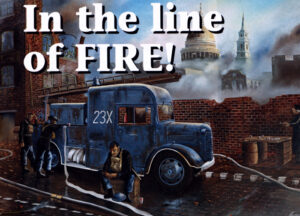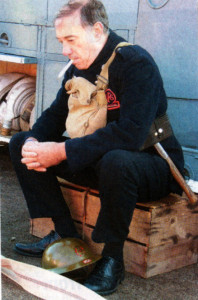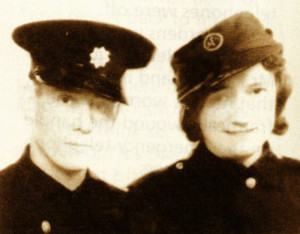 For Frank Somerville, growing up in London’s East End during the 1950s and 60s was not easy. His father Bill had worked hard but, although he was never cruel to his wife or children, he simply had no interest in them. Fortunately for the young Frank, what his father lacked in love and care, his mother Minnie made up for.
For Frank Somerville, growing up in London’s East End during the 1950s and 60s was not easy. His father Bill had worked hard but, although he was never cruel to his wife or children, he simply had no interest in them. Fortunately for the young Frank, what his father lacked in love and care, his mother Minnie made up for.
Frank felt indifference when Bill passed away in 1977, but when Minnie died in 1993, his sorrow was intense. When the
family home was cleared Frank was given a shoebox that had apparently lain in the attic since the war years. Like most men of his generation Frank had a ‘sort of’ interest in WWII, so he looked through the papers and documents it contained.
He knew that Bill and Minnie had served in London’s Auxiliary Fire Service (AFS) and National Fire Service (NFS) during the war, although Bill had never spoken about it. It therefore came has no great
surprise to find wartime Fire Brigade training manuals and other related documents. Among them was a letter from the NFS thanking Bill for his wartime service, and a photo of Bill and Minnie taken on their wedding day in 1939, both in Fire Service uniform.
Also there were birthday, Christmas and Valentine cards sent between the couple. Frank felt it intrusive to read them, yet they moved him deeply.
Words of love and affection from Minnie to her husband he could understand, but those from Bill to his wife seemed incomprehensible from the man he thought he knew.
Frank understood that relationships go sour but his parent’s marriage had suffered more than just the ravages of time. It dawned on him that something drastic must have happened to his father.
Over the next few months Frank tracked down those who had known his father and gradually pieced together a story that would change his life.
One terrible night…

Bill was born in Hackney in 1913, but little is known of him except that he was a mechanic, who had also worked for a short time as a cinema projectionist. In 1938 he joined the newly formed AFS, and throughout the Blitz served his country in a way that could not have been imagined just a few years previously.
Bill was on duty on December 29th, 1940, during the ‘second Great Fire of London’. When Churchill gave the order “Whatever else burns in the City of London, save St Paul’s,” Bill Somerville was there. It was, however, another location that kept cropping up when Bill’s friends related their memories of him – the Old Palace School, in Bow.
Bill was part of the crew of a Heavy Unit appliance based at
Sub Station 23X, at Milborne Road School, in Hackney. On April 19th, 1941, it was believed that the Luftwaffe would concentrate its raids on the East End docks. As was normal when such intelligence was available, firemen from several stations were concentrated in the area, including a number from Sub Station 23X. Firemen and women from Beckenham, Bow and Homerton were on standby in the Sub Station at Old Palace School. There may have been others. One can only imagine the fear the fire fighters must have felt that night, knowing that at any time they could be in the midst of high explosive bombs and incendiaries.
From official documents, Frank found out a great deal about what happened that night, but much of what is known came from the testaments of those who were there… At 1.43am in the early morning of April 20th, what was described at the time as a 1,0001b land mine exploded on or very close to Old Palace School. Within seconds half the school was a pile of rubble and dust.
The remainder was alight and houses all around had been partially demolished.
In those few seconds, 32 firemen and two women control room assistants perished, including six of the eight-man crew of Bill’s Heavy Unit.
Bill was not on duty that night, but soon afterwards was helping to search for his missing colleagues. Of the 34 who died, the remains of only 11 were found.
It is apparent that soon afterwards, Bill started to change. Anyone who has been part of a unit in military or civilian services knows that a unique bond is formed between those who work together. Did he feel guilt for having survived when six of his crew had been killed? Was it the devastation he witnessed while searching for them that affected him?
Today we would probably say Bill suffered from Post Traumatic Stress Disorder but in those days there was no such thing. He was not in the least unique: thousands of men and women came through WWII bearing terrible physical and mental scars. Bill was just one among so many of that generation who returned to ‘normal life’ after the war and simply got on with it.

Through his discoveries, Frank began to feel terrible guilt, but of course it was too late to talk to his father about the experiences he believed had changed him. It gave him a determination to ensure that Britain’s wartime firemen and women, including his father, would never be forgotten. As far as Frank was concerned, the country owed them as much respect as those who had served in the armed forces.
His interest developed when he began buying wartime fire service memorabilia, and then he installed a plaque at the rebuilt Old Palace School in memory of the 34 firemen and women who died there.
Along with a few like-minded people, he formed ‘Firemen Remembered’, a group dedicated to commemorating the role of wartime as well as modern fire fighters.
The group now has a genuine wartime Heavy Unit appliance, painted to represent the one that was destroyed in the school bombing. This is kept at the wartime fire station at Twinwood Airfield. They have also placed plaques at many locations throughout London where fire fighters fell in the line of duty during the war.
Now living in Northamptonshire, Frank, along with the fire engine and its crew, visits schools in the county to talk about the wartime efforts of the fire fighters. They can also be seen at many 1940s’ events throughout the country. In May 2013 Frank was awarded the Chief Fire Officer’s Commendation in recognition of this important work.
Keith Hill.








